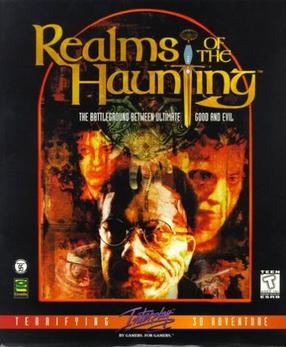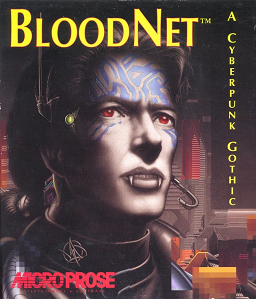
Duke Nukem 3D is a first-person shooter video game developed by 3D Realms. It is a sequel to the platform games Duke Nukem and Duke Nukem II, published by 3D Realms.

Aliens Versus Predator is a 1999 science fiction first-person shooter video game developed by Rebellion Developments and published by Fox Interactive for Microsoft Windows, Mac OS, and Mac OS X. It is a part of the Alien and Predator crossover franchise, Alien vs. Predator. A sequel, Aliens Versus Predator 2, was developed by Monolith Productions and released by Sierra in 2001.

Postal is a 1997 isometric top-down shooter video game developed by Running with Scissors and published by Ripcord Games. Players assume the role of the Postal Dude, a man who goes on a killing spree throughout the fictional town of Paradise, Arizona to cure what he believes to be a "hate plague" released by the United States Air Force.

Abuse is a run and gun video game developed by Crack dot Com and published by Electronic Arts in North America and Origin Systems in Europe. It was released on February 29, 1996 for MS-DOS. A Mac OS port of the game was published by Bungie and released on March 5, 1997. The game's source code, along with some of the shareware content, has been in the public domain since the late 1990s and has been ported to Linux and many other platforms.

Darklands is a historical fantasy role-playing video game developed and published by MicroProse in 1992 for MS-DOS. The game is set in the Holy Roman Empire during the 15th century. While the geographic setting is historically accurate, the game features many supernatural elements.

Sword of the Samurai is an action and strategy video game developed and published by MicroProse in 1989 for the DOS platform. It features role-playing, strategy, and arcade elements set in feudal Japan. The player begins the game as a little-known vassal samurai; his ultimate goal is to replace Oda Nobunaga as the daimyō responsible for reunifying Sengoku Japan.

Wings is a World War I video game developed and published by Cinemaware. It was released for the Amiga in 1990. The action sequences are similar in style to those of the 1927 silent film Wings.

Redline is a 1999 post-apocalyptic combination first-person shooter/car combat game for Windows. It was developed by Beyond Games and published by Accolade. In Europe, the game is known as Redline - Gang Warfare: 2066. It is a spiritual successor to the Atari Lynx video game BattleWheels. The game was noted for allowing players to enter or exit vehicles during combat at anytime, thus combining the genres of car combat and first-person shooting. This was the last game Accolade published before being acquired by Infogrames.

Epic Pinball is a 1993 pinball video game developed by James Schmalz and published by Epic MegaGames. The initial release pre-dated Schmalz' Digital Extremes name. The game is played seen from a 2D top-down view within a scrollable window with plain raster graphics in 320x240. It was noted for being programmed entirely in x86 assembly language for MS-DOS systems.

Realms of the Haunting is a first-person adventure shooter game developed by Gremlin Interactive and published by Interplay Productions. It was released in 1996 for MS-DOS compatible operating systems. The 3D engine used in this game was borrowed from Gremlin's own Normality.

Deadly Dozen is a 2001 World War II oriented squad-based first-person shooter video game developed by nFusion Interactive. The title refers to the famous World War II film The Dirty Dozen. As in the film, the main protagonists are military misfits sentenced to death or long term imprisonment who are given a chance to redeem themselves by going on dangerous missions. The game was followed by a sequel titled Deadly Dozen: Pacific Theater.
Mac gaming refers to the use of video games on Macintosh personal computers. In the 1990s, Apple computers did not attract the same level of video game development as Microsoft Windows computers due to the high popularity of Windows and, for 3D gaming, Microsoft's DirectX technology. In recent years, the introduction of Mac OS X and support for Intel processors has eased the porting of many games, including 3D games through use of OpenGL, and more recently, Apple's own Metal API API. Virtualization technology and the Boot Camp dual-boot utility also permit the use of Windows and its games on Macintosh computers. Today, a growing number of popular games run natively on macOS, though as of early 2019, a majority still require the use of Microsoft Windows.

BloodNet is a cyberpunk-themed role-playing video game video game developed and published by MicroProse for MS-DOS in 1993. An Amiga port was released in 1994 by Catfish and Teeny Weeny Games. An emulated version for Microsoft Windows, Mac OS X and Linux was released in 2014.
Linux-based operating systems can be used for playing video games. Because many games are not natively supported for the Linux kernel, various software has been made to run Windows games, software, and programs, such as Wine, Cedega, DXVK, and Proton, and managers such as Lutris and PlayOnLinux. The Linux gaming community has a presence on the internet with users who attempt to run games that are not officially supported on Linux.

Otto Matic is a 2001 action-adventure video game developed by Pangea Software and published by Aspyr Media for Mac OS 8, Mac OS 9 and Mac OS X. It came bundled with iMac G3 and G4 computers. The game was later ported by Ideas From the Deep to Microsoft Windows in 2004. An iPhone OS port, titled Otto Matic: Alien Invasion, was released by Pangea in 2009.

GOG.com is a digital distribution platform for video games and films. It is operated by GOG sp. z o.o., a wholly owned subsidiary of CD Projekt based in Warsaw, Poland. GOG.com delivers DRM-free video games through its digital platform for Microsoft Windows, macOS and Linux.

Steam Machine was a series of small form factor gaming computers by Valve, designed to operate SteamOS to provide a game console-like experience. Several computer vendors were engaged with Valve to develop their own versions of Steam Machines for retail, offering additional options atop Valve's requirements such as dual-booting options with Microsoft Windows and the ability to upgrade the computer. Consumers could digitally purchase video games on their Steam Machine through Valve's namesake Steam storefront.

Cryptark is an action roguelike video game developed and published by Alientrap for Microsoft Windows, OS X, Linux, and PlayStation 4. The game was released on Microsoft Windows and PlayStation 4 on June 20, 2017. A sequel named Gunhead was released in November 2023. Unlike its predecessor, Gunhead is played from a first-person perspective with VR implementation being a post-release possibility.

Project Warlock is a 2018 first-person shooter video game developed by Polish studio Buckshot Software and published by Gaming Company. Project Warlock is notable for being created by 18-year-old Jakub Cislo, who developed the game while still attending high school. A sequel, titled Project Warlock II, is currently in development.

















